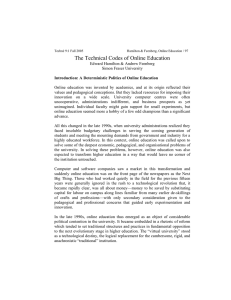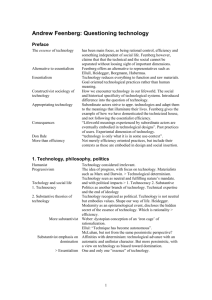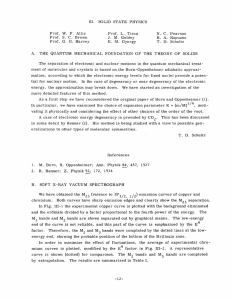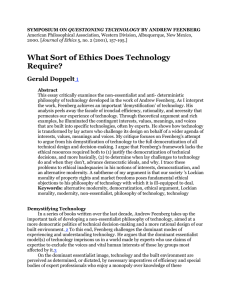Document 11159861
advertisement
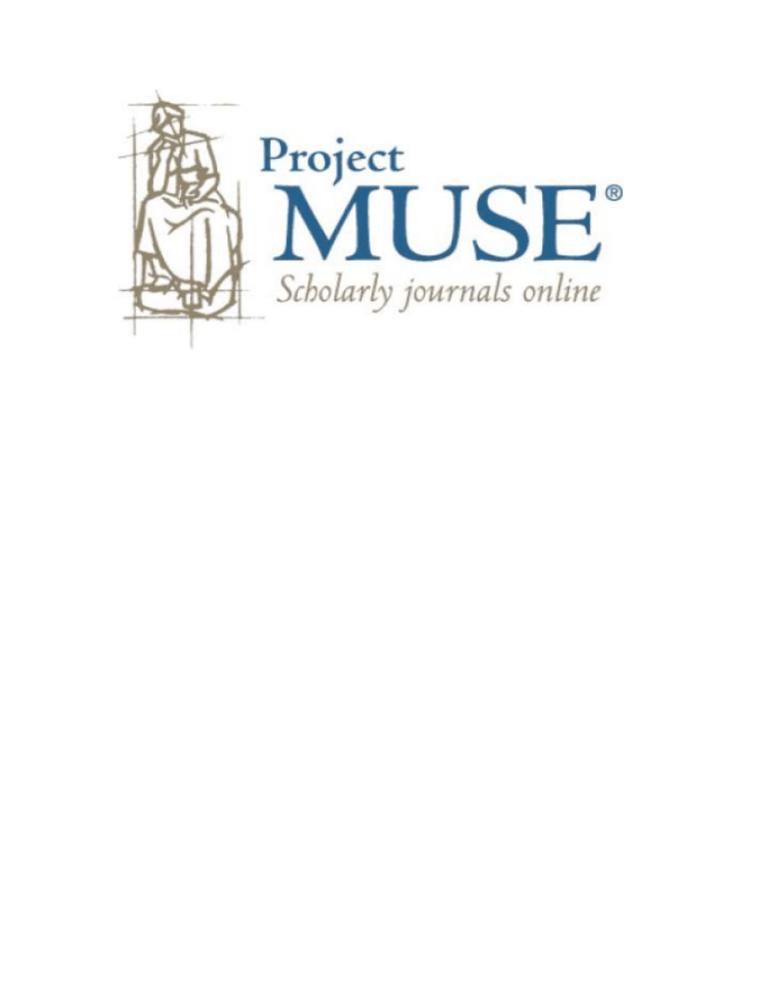
B O O K R E V I E W S solutions, or new techniques for urban planning will be disappointed, as Moore is more interested in providing a critical analysis of the current notions of sustainability capable of catalyzing action than he is in presenting positive solutions. Accordingly, his book might have been more appropriately titled Alternative Theories of the Sustainable City. This book will find its greatest use among those interested in the intersection of politics, technology, and urban development, and it will be of particular interest to historians examining the social construction of technology. Although it is questionable whether sustainability really does, or should, constitute the dominant social narrative of the United States—as Moore argues—the application of social theory to notions of sustainability and how communities perceive urban politics and technology enriches the current discourse on technology and culture. However, coexistence of an array of stories, with sustainability as simply one of the many rather than as a dominant narrative, is perhaps a more accurate if not more popular conception of the role of sustainability within the broader culture. With its rich discussion of philosophical and methodological foundations, its clear presentation, and its engaging narrative style, this book can be read straight through as a complete text, or piecemeal as distinct case studies, or as a source book enhanced by the generous bibliographies closing each chapter. Ultimately, it is really about agency, about noting the collective human actions which, through the rubric of public talk, drive social change. Moore may attribute far more effective power to the agency of citizens than actually exists in the cities examined. Consequently, the technologies of sustainable city-building cease to be neutral features autonomously implemented through “best practices” initiatives and instead become active and value-laden tools for comprehensive change. JANA CEPHAS Jana Cephas is in the doctoral program in architecture at Harvard University. Democratizing Technology: Andrew Feenberg’s Critical Theory of Technology. Edited by Tyler J. Veak. Albany: State University of New York Press, 2006. Pp. xxii+229. $83.50/$27.95. This is an anthology of ten essays engaging the work of Andrew Feenberg, primarily his Questioning Technology (1999) but more generally his philosophy of technology. Tyler Veak’s introduction rightly suggests that the breadth of approaches taken by the different authors gives the book a loose organization. Indeed, some take so broad a view that their essays seem merely occasioned by Feenberg’s work. This looseness would be a fault, ultimately, were it not for two factors that I shall discuss below. 519 T E C H N O L O G Y APRIL 2008 VOL. 49 A N D C U LT U R E Part 1 is more or less oriented toward the philosophical underpinnings of Feenberg’s theory. There is a divide in philosophy of technology between so-called substantivist and social-constructivist approaches. Substantivism—for instance, Martin Heidegger’s view—holds that there is an essence of technology that must be understood in order to comprehend and critique our technological world. Relatedly, critical theorists like Herbert Marcuse and Jürgen Habermas also take substantivist positions, accounting for technology as an objectified form of instrumental rationality. Social-constructivism maintains that technology has no essence of its own in contradistinction from the social and political sphere. Technology represents social forces, but it also contributes to constructing those very forces. Feenberg’s contribution to philosophy of technology attempts to bridge the gap, or to take the best from both substantivist and constructivist approaches. The essays in part 1 crisscross this conceptual territory. Trish Glazebrook and Larry Hickman both give brief accounts of Feenberg’s work before seemingly setting it aside in pursuit of their own agendas. While there may be some apparent similarities between Feenberg’s critical theory of technology and ecofeminism (Glazebrook) or John Dewey’s account of technology (Hickman), it is not immediately clear how such discussion advances understanding of technology or of Feenberg’s theory. More critically pointed are the essays by David Stump, Simon Cooper, and Iain Thompson, all of whom take issue with some aspect of the formation of Feenberg’s theory. Stump claims Feenberg is (intriguingly) both too much of a social constructivist and too much of an essentialist, despite the usual polar opposition between these approaches. Cooper suggests that Feenberg’s theory is blind to the effects of “posthuman” technologies. Thompson criticizes Feenberg’s account of Heidegger’s essentialism and argues that, without it, criticism is not grounded. The impression they give overall is very nearly that Questioning Technology is a sort of Rorschach blot for philosophers of technology. Part 2 focuses on the ramifications of Feenberg’s critical theory for politics and for social and economic life. Feenberg’s work emphasizes the public good of democratizing design and implementation of technology to turn technological development toward goals other than accumulation of capital and power—for example, the public appropriation of the French Minitel system or the efforts of HIV/AIDS activists to drive medical research to be more responsive to the needs of patients. Feenberg’s call for democratizing technology has a certain kinship with William Sullivan’s push for democratization of the medical field and education: both operate with a conception of democracy that values the process of open and participatory deliberation as being itself a public good. Gerald Doppelt argues that Feenberg’s theory lacks a clear account of democracy because it seems to 520 B O O K R E V I E W S lack a standard or aim. This criticism is echoed in Albert Borgmann’s somewhat ironic suggestion that democratizing technology may have the unfortunate result that people will want technologies that are nondemocratic. Paul Thompson, Andrew Light, and Edward Woodhouse close out the critical portion of the volume with extensions of Feenberg’s analysis. Thompson offers an account of commodification as an additional critical tool. Light considers the implications for environmental policy, and Woodhouse applies Feenberg’s view to specific examples of corporate decisionmaking to inquire into what it would mean to make these more democratic. What makes this anthology more than a loose collection is Feenberg’s “Replies to Critics.” First, he conscientiously engages each author in serious dialogue—one of the best such replies I’ve seen. Second, he draws together the threads of the discussion and gives the book a coherence and depth of exploration it would not otherwise have. Returning to the critics on the basis of Feenberg’s replies shows that, as loosely connected or tangential as they may have been, all the essays provide greater context and insight into this most serious philosophical issue. CHRIS NAGEL Dr. Nagel teaches philosophy at California State University, Stanislaus. 521
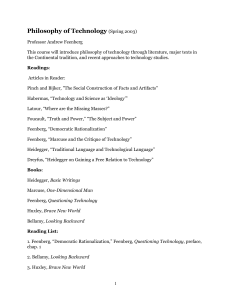
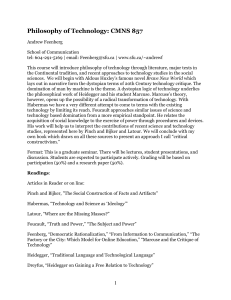
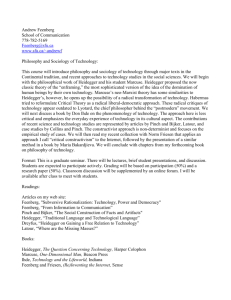
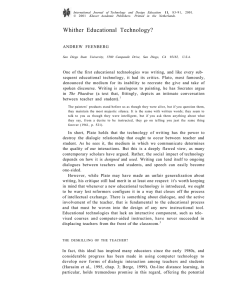
![Filosofia da tecnologia [T] [I]](http://s2.studylib.net/store/data/011159877_1-5619f4cefe20dd655fe24fd21e5fe874-300x300.png)
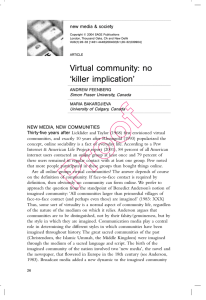
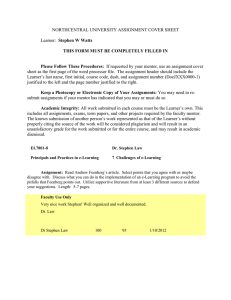
![This article was downloaded by: [Canadian Research Knowledge Network] On: 6 November 2010](http://s2.studylib.net/store/data/011159892_1-6244f2b8de305a71e5f003f7a954d873-300x300.png)
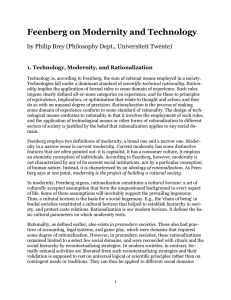
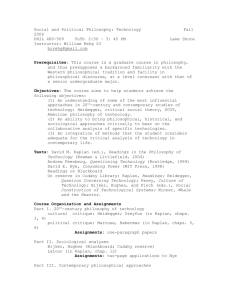
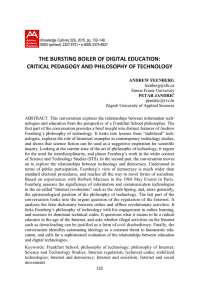
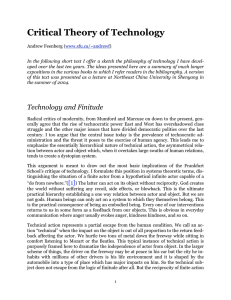
![This article was downloaded by: [Simon Fraser University] Publisher: Routledge](http://s2.studylib.net/store/data/011159854_1-9b6d2efb6eee2fa13f83a0a13bbc528b-300x300.png)
